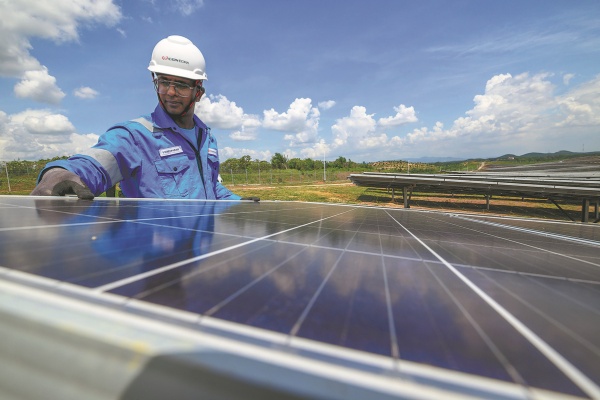
A worker conducts a routine checkup on the solar panels at a photovoltaic power station in Kedah, Malaysia, on June 6, 2024. This power station is operated by CGN Energy International Holdings Co. It covers an area of 105.2 hectares and commenced operations in 2019. [Photo/Xinhua]
Malaysia's clean energy transition has been significantly propelled by Chinese energy companies' active involvement in recent years, including China General Nuclear Power Corp, or CGN, which has emerged as the country's second-largest independent power producer with 5.08 gigawatts of capacity through key gas and solar ventures, industry experts and company executives said.
The company, China's largest nuclear power operator in terms of installed capacity, has solidified its position as a major energy player in Malaysia, as it has been stepping up efforts in exporting advanced technologies and production capacity overseas in recent years, it said.
The company has been continuously leveraging its integrated industrial chain in recent years, and its international operations have successfully brought Chinese renewable energy supply chains to countries including Malaysia, Laos and Brazil, driving the export of photovoltaic and wind turbine equipment capable of generating a combined 1.6 GW of power, said Zhang Chaoqun, president of CGN Energy International Holdings Co.
The 2.24-GW gas-fired Edra Melaka Power Plant in Malaysia, built by CGN, is the nation's largest gas power plant with low-carbon combined cycle gas turbines. It is capable of providing about 11 percent of the total electricity demand in the Peninsular Malaysia, CGN said.
The plant supplied 13.17 billion kWh throughout last year.
The EMPP, with a total installed capacity of 2.24 GW, applies the world's most advanced and efficient gas turbine technology and is capable of achieving efficiency of over 60 percent in electricity production, it said.
The power plant will support the Malaysian government's target to achieve 31 percent renewable energy capacity by 2025, according to local government.
Analysts believe the cooperation exemplifies a win-win scenario, as Malaysia gains access to advanced and efficient power generation technology, enhancing its energy security, while China demonstrates the global competitiveness of its energy sector.
China has been increasing efforts to export advanced energy technologies and green solutions in recent years, and the investments are poised to play a crucial role in the future of energy in countries that import such technologies, said Lin Boqiang, head of the China Institute for Studies in Energy Policy at Xiamen University.
The EMPP plant's operational success has not only brought security to a substantial portion of Malaysia's power needs, but has also set a new efficiency standard for the region, Lin added.
CGN has significantly ramped up its investment in innovation last year, dedicating 5.95 billion yuan ($810 million) to research and development. It has expanded its domestic capacity by 11.53 million kW, further advancing its clean energy portfolio.
To date, CGN's cumulative power supply to Malaysia has exceeded 200 billion kilowatt-hours.